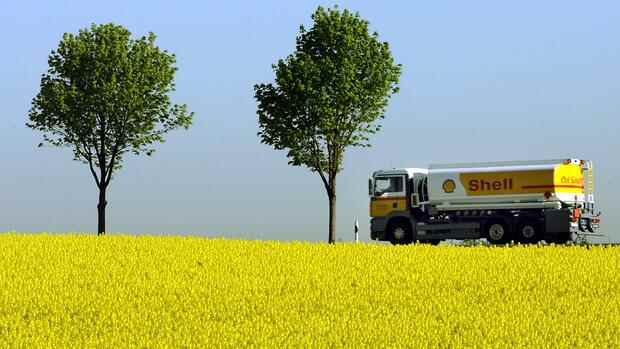The Ministry of the Environment is fundamentally critical of the climate protection effect of biofuel. This was “strongly doubted”.
(Photo: dpa)
Berlin Federal Environment Minister Steffi Lemke (Greens) wants to gradually reduce the use of biofuels from food and feed crops in the coming years and phase them out completely by 2030. This emerges from a paper from her ministry. According to information from government circles, the regulation should come into force by mid-June.
It is planned to increase the permissible upper limit for the admixture of biofuels produced from food and feed crops in order to meet the greenhouse gas reduction quota (GHG quota) from the current 4.4 percent to 2.5 percent in the coming year and in gradually reduced to zero percent in the following years by 2030.
The reason given in the paper is that it is a matter of “steering significantly fewer food and feed plants into energy use in transport, thus increasing the availability of raw materials and reducing the pressure on prices, especially for food and agricultural land”.
As a result of the Ukraine war, prices for agricultural products have already risen significantly. “A shortage of agricultural goods is expected worldwide. This particularly affects poorer countries in the Global South.
Top jobs of the day
Find the best jobs now and
be notified by email.
German consumers are also affected by the high price increase. Without lowering the upper limit for the admixture, around 9.8 million tons of food and feed would be used for the use of biofuels in Germany in 2023. With the planned reduction in the permissible quotas, the Federal Environment Ministry is following a decision made by the state environment ministers last week.
For Federal Transport Minister Volker Wissing (FDP), the plans of his cabinet colleague have sensitive consequences. In terms of climate protection, the transport sector is one of the problem children anyway. The reduction targets are regularly missed here.
With the reduction in quotas, Wissing is losing one of the most important instruments for CO2 reduction. “The Ministry of Transport has not achieved the climate goals in transport in recent years. In fact, it cannot do without biofuels as the most important measure for reducing greenhouse gas emissions,” warned Elmar Baumann, Managing Director of the German Biofuels Industry Association (VDB).
To compensate for the phasing out of biofuel from food and feed crops by 2030, the ministry wants to slightly increase the permitted amounts of fuel from waste-based biofuels. The use of electricity in electric vehicles or hydrogen in the refineries should also be counted more towards the CO2 balance by the fuel manufacturers.
The Ministry of the Environment is fundamentally critical of the climate protection effect of biofuel. This is “strongly in doubt”, since fuel obtained in this way contributes indirectly to deforestation and high carbon dioxide emissions by displacing food production.
>> Also read: German Development Minister: “Putin is using hunger as a weapon”
The industry sees it completely differently. “We do not use bread grain in our bioethanol. There is no competition with food there,” said Claus Sauter, CEO of Verbio AG.
Baumann from the VDB also sees it this way: “The biofuel manufacturers do not withdraw any raw materials from the food market. So there is no competition between tank and plate.”
The VDB managing director accused the environment minister of cynicism. It is “pushing the war in Ukraine to achieve its real goal: phasing out biofuels by 2030”.
Baumann also warned against relying solely on electromobility to reduce greenhouse gases in the transport sector: “The number of vehicles cannot be addressed without the use of biofuels. In 2030 there will still be at least 30 million cars with internal combustion engines in operation.”
More: Should farmers produce more grain? Planting plans lead to disputes
